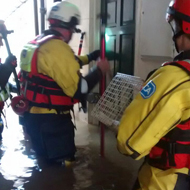
Nearly 16,000 calls received about animal welfare
The Christmas season was, not unusually, filled with drama for RSPCA rescue teams this year, who received thousands of calls about animal welfare offences and abandoned pets.
While many people were busy celebrating the festive period, holiday cheer was thin on the ground for hundreds of animals.
In total, the charity received 15,848 calls between 23 December and 2 January, nearly 5,000 of which were complaints about animal welfare complaints and 927 of which related to abandoned animals.
On Christmas Eve a cold and frightened Staffie-cross was found tied to a lamppost in Newcastle upon Tyne, who was treated to a Christmas lunch at one of the charity's centres and is now being showered with TLC.
Elsewhere a shih tzu cross was also found tied to a lamppost with such badly matted fur he couldn't even see. Now cleaned up, warmed up and fed, he has been named Pudding by RSPCA staff.
Sadly 12 royal pythons dumped in a cardboard box in Plymouth were not so fortunate. As snakes need controlled temperatures and struggle to survive in cold winter weather, all but two of the pythons died.
The floods that besieged Yorkshire from Boxing Day onwards also kept the charity busy, causing devastation for animals as well as people and property. The RSPCA worked with fire and rescue, police and other agencies to rescue those in peril.
Three cats were saved from flooded houses in York and even a baby otter and a mole were scooped up and rescued.
The charity was also called out to a number of more bizarre rescues, including a fallow deer whose antlers get caught in a child's swing and 30 or 40 pigs found straying on a mayor road on New Year's Eve.
Assistant director of the inspectorate, Dermot Murphy, said: "Very sadly, we see cases every year where people neglect or abandon their pets at holiday times, and emergency rescues can happen any day of the year so we need inspectors on hand to help 24/7 - regardless of whether it is a bank holiday.
"In fact, this time of year can often be busier with wildlife and pets more vulnerable in colder, stormier winter weather."
Image courtesy of the RSPCA



 The Veterinary Medicines Directorate (VMD) is inviting applications from veterinary students to attend a one-week extramural studies (EMS) placement in July 2026.
The Veterinary Medicines Directorate (VMD) is inviting applications from veterinary students to attend a one-week extramural studies (EMS) placement in July 2026.